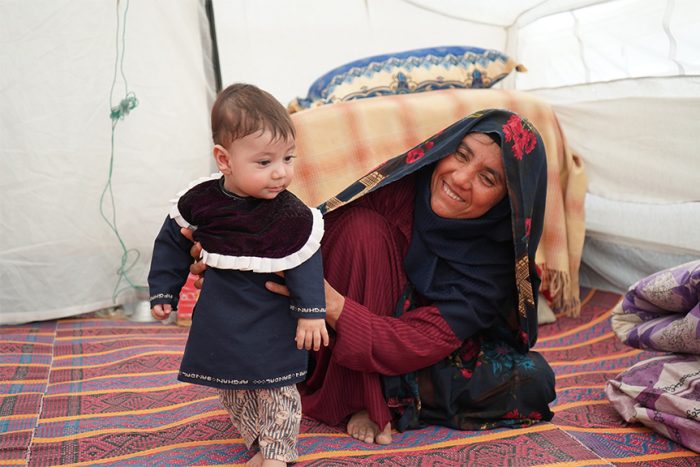A Home No More: A Family’s Fight for Survival in the Aftermath of the Herat Earthquake
In Herat’s village of Kushkak, 35-year-old Golnaz shared a small and simple home with her husband, their five children, and her husband’s second wife. Nestled in a plain-like area, surrounded by greens and flora, the family lived a humble life. They do not own any agricultural land to depend on for an income but they owned livestock which they took good care of. With limited income and only a single water source for the family and their livestock to survive on, Golnaz depended heavily on all and any natural resources around them for sustenance.
As traditional gender norms in Afghanistan would have it, Golnaz and the second wife manage all household chores and care-taking duties – whether those of her children or of their livestock. Golnaaz would heartily prepare family meals mostly consuming the dairy produce of their animals and would also craft carpets from sheep wool- a skill passed on to her through generations. While, across the border in Iran, her husband earned an income for the family as a migrant labourer at a recycling factory. Despite the challenges of their harsh environment and maintaining a long-distance relationship, Golnaz and her husband had built together a stable life for their family of eight.
The family cherished the short time that they would all be together when Golnaz’s husband would visit from Iran. This joyous reunion was tragically cut short the last time when the earthquake in Herat struck on October 7th (2023). As the earthquake struck, Golnaz’s elder children were at school and the rest of the family was at home when their house collapsed, entrapping six of their family members. Miraculously, Golnaz freed herself and rescued the others, but their home was reduced to rubble within minutes. “My husband and his second wife were injured, requiring hospitalisation in Herat. While the second wife was discharged, my husband remained hospitalised. Our six-roomed house was completely destroyed, and all ten of our livestock perished.” The village, once a haven of joy, and simplicity, became unrecognisable—left in ruins.The humanitarian agencies were providing them with ready food but the shelter was the top need for the family.
To immediately respond to the earthquake, Community World Service Asia (CWSA) started coordinating with relevant stakeholders, including the provincial government and the global aid community. The first response came through the support of CWS Japan and Ministry of Foreign Affairs – Japan, recognising the critical need for shelter, CWSA distributed winterization tents to hundred most severely affected families, including Golnaz’s. This temporary solution provided a much-needed sense of security and improved living conditions to families hit by the earthquake. On the first night after the earthquake, the family had no choice but to stay in the open space, as their house was destroyed and a series of aftershocks continued. In the following days, they had to live with their relative in a cramped tent, which only had enough space for the children, while the adults had to sleep outside.
In response to the critical needs of impacted families, Community World Service Asia, with the support of Japan Platform, launched a cash assistance project tailored to empower the affected households to meet their specific needs through direct purchases. Within this initiative, the family of Golnaz, alongside 159 other households in the Zindajan district of Herat province, received their received the first payment of USD 170 (equivalent in AFN) in January 2024, a timely support considering her son was still suffering from an ear injury caused by the earthquake and had yet to fully recover. Utilising this initial funding, she was able to seek medical treatment for him in the city, where he was prescribed medication and recommended for follow-up care, necessitating their extended stay in the city for his recovery. In February, the second payment was disbursed to Golnaz, which she primarily used for purchasing food and also to continue her son’s medical treatment. She is anticipated to receive a third payment in March 2024, further aiding her family’s needs and her son’s ongoing medical care.
Challenges still remain for affected communities though. Golnaz’s children are unable to attend school due to the damaged infrastructure in the area. Her husband, though discharged now from the hospital, requires ongoing care to reach full recovery. The water well, providing water to their village, was also destroyed, forcing them to rely only on humanitarian organisations for water access and transportation. Despite the challenges, Golnaz remains hopeful. She advocates for a sustainable solution to ensure water access within the village, anticipating the challenges that come with the winter snowfall. Golnaz emphasizes on the need for a permanent shelter, a crucial step towards rebuilding their lives.







